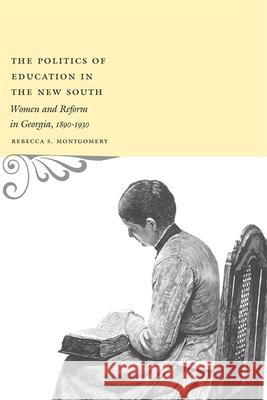The Politics of Education in the New South: Women and Reform in Georgia, 1890-1930 » książka
The Politics of Education in the New South: Women and Reform in Georgia, 1890-1930
ISBN-13: 9780807133477 / Angielski / Miękka / 2008 / 272 str.
Alarmed at the growing poverty, illiteracy, class strife, and vulnerability of women after the upheavals of Reconstruction, female activists in Georgia advocated a fair and just system of education as a way of providing economic opportunity for women and the rural and urban poor. Their focus on educational reform transfigured private and public social relations in the New South, as Rebecca S. Montgomery details in this expansive study. The Politics of Education in the New South provides the most complete picture of women's role in expanding the democratic promise of education in the South and reveals how concern about their own status motivated these women to push for reform on behalf of others.
Montgomery argues that women's prolonged campaign for educational improvements reflected their concern for distributing public resources more equitably. Middle-class white women in Georgia recognized the crippling effects of discrimination and state inaction, which they came to understand in terms of both gender and class. They subsequently pushed for admission of women to Georgia's state colleges and universities and for rural school improvement, home extension services, public kindergartens, child labor reforms, and the establishment of female-run boarding schools in the mountains of North Georgia. In the process, a distinct female political culture developed that directly opposed the individualism, corruption, and short-sightedness that plagued formal politics in the New South.
How womens efforts to reform public education in postbellum Georgia had the broader effect of reshaping social relationsAfter the upheavals of Reconstruction, white men in Georgia made a concerted effort to restore state government to its antebellum role. Landed and industrial elites supported policies that benefited only themselves and the cotton economy, fiercely opposing any measures that might have limited access to cheap labor or distributed the costs of government more equitably. Alarmed at the growing poverty, illiteracy, class strife, and vulnerability of women, female activists in Georgia advocated a fair and just system of education as a way of providing economic opportunity for women and the rural and urban poor. Their focus on educational reform transfigured private and public social relations in the New South, as Rebecca S. Montgomery details in her expansive new study. Montgomery argues that womens prolonged campaign for educational improvements reflected their concern for distributing public resources more equitably. Middle-class white women in Georgia recognized the crippling effects of discrimination and state inaction, which they came to understand in terms of both gender and class. They subsequently pushed for admission of women to Georgias state colleges and universities, rural school improvement, home extension services, public kindergartens, child labor reforms, and the establishment of female-run boarding schools in the mountains of North Georgia. In the process, Montgomery explains, a distinct female political culture developed that stood in opposition to the individualism, corruption, and short-sightedness that plagued formal politics in the New South. Though women used the male-dominated state government to mediate between competing interests in their crusade, they also promoted a new concept of manhood in which honor and integrity were based on the obligation to serve family and society. The Politics of Education in the New South provides the first complete picture of womens role in expanding the democratic promise of education in the South and shows how concern about their status as female citizens motivated women to Progressive reform on behalf of others.Rebecca S. Montgomery is an assistant professor of history at Texas State University at San Marcos.











